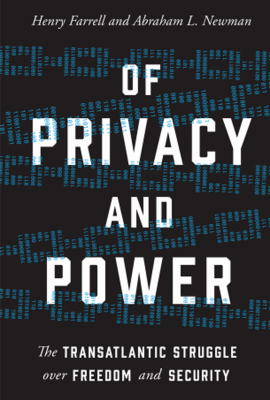Henry Farrell
Former Fellow
Professional Affiliation
Professor of Political Science and International Affairs, George Washington University
Expert Bio
I am an associate professor of political science and international affairs at the George Washington University. I have previously been assistant professor at George Washington University and the University of Toronto, and a senior research fellow at the Max-Planck Project Group in Bonn, Germany. I work on a variety of topics, including trust, the politics of the Internet and international and comparative political economy. My new book, The Political Economy of Trust: Interests, Institutions and Inter-Firm Cooperation, has just been published by Cambridge University Press. In addition I have authored or co-authored twenty academic articles, and numerous book chapters for edited volumes. I am a co-founder of the popular academic blog Crooked Timber, and also blogs at The Monkey Cage. I have written articles for publications including The Financial Times, The American Prospect, The Boston Review, The Nation, The Chronicle of Higher Education, Times Higher Education, and the Australian Academic Supplement among others.
Education
B.A. (1991) Political Science/Economics, University College Dublin; M.A. (1993) Political Science, University College Dublin; M.A. (2000) German and European Studies, Georgetown University; Ph.D. (2000) Government, Georgetown University
Experience
- Associate Professor, The George Washington University, 2009-present
- Assistant Professor, The George Washington University, 2004-2009
- Assistant Professor, University of Toronto, 2002-2004
Expertise
Western Europe, EU-US relations, e-commerce regulation, internet and politics
Wilson Center Project
"Governance of the Information Age"
Project Summary
Increasing interdependence between advanced industrialized economies challenges scholars and policy makers to arrive at a better understanding of how politics works in a world where regulatory decisions taken in one state have major repercussions for others. The Internet and related technologies have helped drive this interdependence, by dramatically lowering the costs of many international transactions. They thus increase the likelihood that states' regulatory policies will come into conflict with each other in areas such as privacy regulation, gambling and taxation of commercial activities. By studying the regulation of e-commerce, we can substantially advance our understanding of the focus driving policy interdependence and its likely political consequences. In particular, we can better understand (a) the reasons why states have typically turned to private actors rather than traditional international institutions or self-help in order to regulate e-commerce, (b) the reasons why some states have been more successful than others in influencing the relevant private actors, and (c) the likely policy consequences of this turn.
Major Publications
- The Political Economy of Trust: Interests, Institutions and Inter-Firm Cooperation in Italy and Germany. (Cambridge University Press 2009).
- "Constructing the International Foundations of E-Commerce: The EU-US Safe Harbor Arrangement," International Organization, 57, 2: 277-306, 2003.
- Henry Farrell and Abraham Newman (forthcoming 2010), "Making International Markets: Domestic Institutions in International Political Economy," introduction to Special Issue on Historical Institutionalism and International Market Regulation, Review of International Political Economy.
Insight & Analysis by Henry Farrell
- Past event
- Science and Technology
Ground Truth Briefing | 5G: Conflicts, Concerns, Collaboration

- Book
- Geoeconomics
Of Privacy and Power: The Transatlantic Struggle over Freedom and Security
